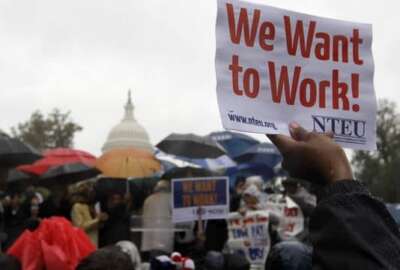

The National Treasury Employees Union had argued it was unconstitutional for the IRS to force tens of thousands of workers to process tax refunds without pay. The...
A federal judge has dismissed a lawsuit that claimed it was unconstitutional for the IRS to recall 45,000 of its employees to process tax returns during the last government shutdown.
The case had been filed by the National Treasury Employees Union and two of the IRS workers who had been forced to work without pay. They claimed the government was abusing a provision in federal law that allows for some civilian employees to work during a shutdown if they are needed for the “safety of human life or the protection of property.”
Judge Richard Leon found that clearly wasn’t the case for the IRS workers, and that the administration recalled only to avoid the “political heat” they would have suffered if tax refunds were late. But in his ruling Monday, he wrote had no jurisdiction to decide the case because the shutdown is no longer in effect and employees were given back pay.
NTEU said Tuesday that it would appeal the decision to the U.S. Court of Appeals for the D.C. Circuit.
“NTEU’s lawsuit is not moot because, regrettably, further shutdowns are certainly capable of being repeated,” Tony Reardon, NTEU’s national president said in a statement. “NTEU believes that a court should review the important question of whether such shutdowns, which will certainly happen again, are consistent with law. We still believe that the Antideficiency Act, the authority that federal agencies use to require excepted employees to work during a government shutdown, violates the Appropriations Clause of the Constitution because it obligates spending that has not been appropriated by Congress.”
Judge Leon found that in order for NTEU to win the lawsuit, he would have to assume that the exact same plantiffs would be hurt in the same way by future shutdowns. But government shutdowns, he wrote, are highly fact-specific, and it’s impossible to know precisely what would happen under another one.
“Numerous contingencies related to a possible future shutdown include: if, when, and under what circumstances Congress might decide to let appropriations lapse; what agencies would be affected by such a lapse, which in turn depends on Congress’s decision to continue to funds certain agencies and not others in the event of a shutdown; and how the affected agencies will respond, including the terms of their contingency plans as well as their circumstance-specific decisions about whether to except certain employees, including the plaintiffs here,” he wrote.
The judge determined he was powerless to resolve the dispute, even though the government’s claims that the recalled IRS workers were needed for life or safety reasons were “dubious.”
“Fortunately for the government, however, not every self-serving transmogrification of the law can be righted by the courts,” he wrote. “Plaintiffs’ claims are nonetheless moot and do not satisfy the capable-of-repetition exception to mootness.”
The case decided this week is only one of several that federal unions have filed in recent years to challenge the way employees are treated during government shutdowns.
NTEU has another lawsuit pending before the Court of Federal Claims. That case, filed on behalf of a Customs and Border Protection officer, claims the government violated the Fair Labor Standards Act (FLSA) by not paying employees minimum wage and overtime during the last shutdown.
And in 2017, in a case brought by the American Federation of Government Employees, a judge ruled the government violated the FLSA during the 2013 shutdown. The court ordered agencies to compensate tens of thousands of employees with twice the back pay they had already received, plus over time.
But it took until last December for attorneys and agencies to determine exactly how many workers were eligible for those damages. The answer: 21,781. But lawyers are still arguing over precisely how much money they’re owed.
AFGE and its lead attorney in the case, Heidi Burakiewicz, have also filed a similar class-action lawsuit over the 2018-2019 shutdown. That case, like NTEU’s, is still awaiting a decision in the Court of Federal Claims.
Copyright © 2025 Federal News Network. All rights reserved. This website is not intended for users located within the European Economic Area.
Jared Serbu is deputy editor of Federal News Network and reports on the Defense Department’s contracting, legislative, workforce and IT issues.
Follow @jserbuWFED



